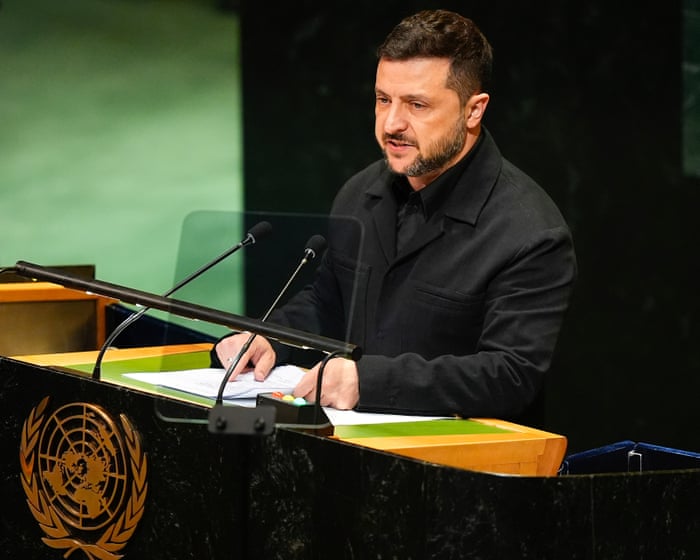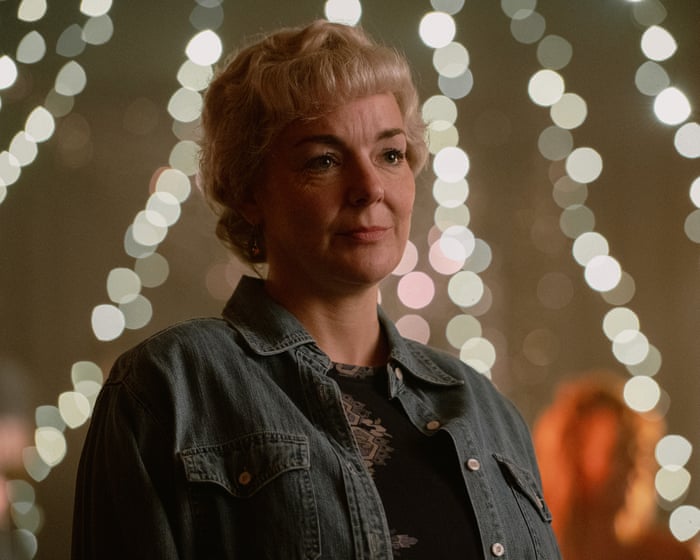Ukrainian President Volodymyr Zelenskyy has called on world leaders to intervene and stop Russia from triggering what he described as “the most destructive arms race in human history.” He warned that the fusion of drone technology and artificial intelligence could lead to catastrophe.
Addressing the UN General Assembly, Zelenskyy aimed to rally not only Western nations but also China. His stark description of how Russia is transforming warfare with technology stood in sharp contrast to Donald Trump’s earlier suggestion that Russia’s military might be a “paper tiger.”
Zelenskyy cautioned that if left unchecked, Vladimir Putin would use drones to spread the war across Europe. “The facts are simple,” he told the UN. “Stopping this war now—and with it, a global arms race—is cheaper than building underground kindergartens or massive bunkers later. Stopping Putin now is cheaper than protecting every port and ship from terrorists. Stopping Russia now is cheaper than wondering who might be forced to build a simple drone armed with a nuclear warhead.”
He reflected that a decade ago, war looked very different, and no one could have imagined that inexpensive drones could create dead zones spanning dozens of kilometers, devoid of movement or life—a scenario once associated only with nuclear strikes. “Now it’s a drone reality, and that’s without AI yet,” he added.
Referring to recent Russian provocations in Europe, including a drone incursion into Poland, Zelenskyy said Putin is determined to “drive the war forward, wider, and deeper.” He reminded the assembly that he had previously warned Europe about Russia’s intentions, and now “Russian drones are flying across Europe.” No country is immune to the spread of war, he stressed, adding, “We are living through the most destructive arms race in human history.”
Zelenskyy did not provide a broad assessment of the war in Ukraine, nor did he directly address Trump’s unexpected claim that Ukraine could reclaim all territory lost since 2022. He only mentioned having had a “good meeting” with the U.S. president on Tuesday.
He emphasized that in today’s world, “only friends and weapons” protect nations—not international law or UN resolutions. Every country faces a choice, he said: pursue peace or continue trading with Moscow, thereby aiding Russia. Those who fund the war, he argued, prolong the captivity of prisoners of war, abducted children, and hostages.
Zelenskyy also expressed concern about Moldova falling under Russian influence. Moldova’s Prime Minister Dorin Recean claimed on Wednesday that Russia is spending hundreds of millions of euros to sway an upcoming parliamentary election and derail the country’s path toward EU membership.
Before Zelenskyy’s speech, Moscow had dismissed Trump’s shift in tone—including his remark that Russia had been “fighting aimlessly for three and a half years”—a stark change from the red-carpet treatment Trump offered Putin at last month’s summit in Alaska.
Kremlin spokesperson Dmitry Peskov suggested Trump’s comments were influenced by his meeting with Zelenskyy in New York. “Of course, President Trump heard Zelenskyy’s version of events, and apparently that shaped the assessment we heard,” Peskov said. He also claimed Russian forces are advancing in Ukraine, albeit cautiously, to minimize losses.
Dmitry Medvedev, Russia’s former president known for his provocative statements, wrote on Telegram that Zelenskyy had drawn Trump into an “alternate reality” where Ukraine could win the war. But Medvedev expressed confidence that Trump would soon change his stance.No doubt, he’ll be back. He always comes back…. Most likely he’ll soon tell [Zelenskyy] to sign an act of surrender,” Medvedev wrote.
Russian military bloggers highlighted Trump’s comments, interpreting them as a sign that he is trying to distance himself from the war—a conflict he once promised to end quickly.
“The U.S. is trying to wash its hands of the situation to save face if Ukraine collapses,” wrote Dva Mayora, a Telegram channel linked to the Russian defense ministry.
On Tuesday, Trump gave an optimistic view of Ukraine’s chances in the war, claiming Russia is in serious economic trouble. It was one of his strongest expressions of support for Kyiv in recent months.
He said that if the Russian public knew what was “really going on with this war,” Ukraine could launch a counteroffensive to “take back all the territory occupied by Russia—and, who knows, maybe even go further than that.”
Trump’s shift in tone is helpful for Ukraine, but actions are needed more than words.
Moscow’s invasion of Ukraine has hit the Russian economy hard. On Wednesday, the finance ministry proposed raising the value-added tax rate by two percentage points to 22%.
Also on Tuesday, Trump criticized European countries for what he called “embarrassing” purchases of Russian oil and gas. He demanded they “immediately stop all energy purchases from Russia” or “we are all wasting a lot of time.”
The EU has significantly cut its use of Russian oil and gas since 2022. In 2024, it bought 19% of its gas and 3% of its oil from Russia, down from 45% and 27% before the full-scale invasion.
European Commission President Ursula von der Leyen said that during a meeting with Trump at the UN, they “agreed on the need to cut Russia’s revenues from fossil fuels, and fast.” She added, “By 2027, Europe will have turned the page on Russian fossil fuels for good.”
Last week, von der Leyen announced plans to stop buying Russian liquefied natural gas by 2027, a year earlier than originally planned. The Commission also plans to expand sanctions to include 118 vessels in Russia’s “shadow fleet”—aging tankers used to transport Russian oil while evading Western price caps.
However, the EU has not yet ended an exemption allowing Hungary and Slovakia to continue buying Russian oil, which was granted in 2022. Both countries have resisted the phase-out plan, despite pressure from Trump, who is an ally of Hungarian Prime Minister Viktor Orbán.
EU sanctions require unanimous agreement, although trade restrictions can be approved by a majority. It is still unclear when or how the latest proposals will be finalized, with senior diplomats set to discuss them in the coming days.
Frequently Asked Questions
Of course Here is a list of FAQs about Zelenskyys call for UN intervention designed to be clear and helpful for a range of readers
FAQs Zelenskyys UN Appeal on Russias Arms Race
BeginnerLevel Questions
1 What is Zelenskyy asking the UN to do
He is urgently asking the United Nations to intervene and take action to stop what he calls Russias most destructive arms race in history
2 What does arms race mean in this context
An arms race is a competition between nations to have the most powerful and advanced military weapons Zelenskyy claims Russia is aggressively building up its arsenal forcing other countries to respond which increases global danger
3 Why is Zelenskyy focusing on the UN
The UNs main purpose is to maintain international peace and security As a global forum Zelenskyy is using it to raise the alarm officially and pressure the international community to act collectively
4 Is this just about nuclear weapons
While nuclear weapons are a major concern the term arms race also includes advanced conventional weapons missiles drones and cyber warfare capabilities that can cause widespread destruction
Advanced Detailed Questions
5 What specific actions does Zelenskyy want the UN to take
He likely wants the UN Security Council to pass resolutions condemning Russias actions impose stricter arms control sanctions and facilitate diplomatic talks to deescalate the situation However Russias veto power on the Security Council makes this very difficult
6 Why does he call it the most destructive arms race
He emphasizes this because modern weapons particularly nuclear arms and precisionguided missiles have far greater destructive power than those from past arms races The risk of miscalculation leading to a global conflict is also extremely high
7 What are the main obstacles to the UN taking effective action
The biggest obstacle is the structure of the UN Security Council Russia is one of the five permanent members with veto power meaning it can block any resolution against itself
8 How does the war in Ukraine relate to a global arms race
The war acts as a catalyst Russias military actions have prompted many Western nations to increase their own defense spending and send advanced weapons to Ukraine which can be seen as the beginning stages of a broader military competition



